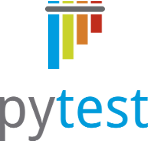Posts Tagged ‘python’
pytest development reorganization, adopt pytest month!
 Today I went live with shifting pytest development to be more community driven. During a discussion at FOSDEM 2015 a significant subset of pytest contributors decided to create two organisations at github and bitbucket and shift core pytest and several plugins to them, on the initial suggestion of Anatoly Bubenkoff. See the new pytest contribution page for details. The teams currently have a dozen members and we are looking forward to integrate more contributors which all get full access and commit rights to all repositories, can push to the website and release to pypi.
Today I went live with shifting pytest development to be more community driven. During a discussion at FOSDEM 2015 a significant subset of pytest contributors decided to create two organisations at github and bitbucket and shift core pytest and several plugins to them, on the initial suggestion of Anatoly Bubenkoff. See the new pytest contribution page for details. The teams currently have a dozen members and we are looking forward to integrate more contributors which all get full access and commit rights to all repositories, can push to the website and release to pypi.
Also at FOSDEM 2015, core pytest contributor Brianna Laugher suggested and started the Adopt pytest month initiative which will bring together pytest contributors, users and Open Source projects interested to use pytest in their project. Many pytest contributors and practioners will participate which means you get excellent support for bringing your testing efforts up to speed with pytest.
The pytest team is also working towards a pytest-2.7 release, take a peak at the current changelog. If you like to get something in, now is a good time to submit a pull request. Or, if you are working with a company you may contract merlinux which in turns contracts contributors to quickly resolve any issues you might have or organises in-house training or consulting. Apart from the direct benefit for your company it’s also a good way to support a sustained and ever-improving testing infrastructure commons for Python (pytest, tox, devpi projects in particular).
Written by holger krekel
February 27, 2015 at 2:56 pm
Posted in metaprogramming
pytest-2.4.0: new fixture features, many bug fixes
- new yield-style fixtures pytest.yield_fixture, allowing to use existing with-style context managers in fixture functions.
- improved pdb support: import pdb ; pdb.set_trace() now works without requiring prior disabling of stdout/stderr capturing. Also the --pdb options works now on collection and internal errors and we introduced a new experimental hook for IDEs/plugins to intercept debugging: pytest_exception_interact(node, call, report).
- shorter monkeypatch variant to allow specifying an import path as a target, for example: monkeypatch.setattr("requests.get", myfunc)
- better unittest/nose compatibility: all teardown methods are now only called if the corresponding setup method succeeded.
- integrate tab-completion on command line options if you have argcomplete configured.
- allow boolean expression directly with skipif/xfail if a “reason” is also specified.
- a new hook pytest_load_initial_conftests allows plugins like pytest-django to influence the environment before conftest files import django.
- reporting: color the last line red or green depending if failures/errors occured or everything passed.
The documentation has been updated to accomodate the changes, see http://pytest.org
To install or upgrade pytest:
pip install -U pytest # or easy_install -U pytest
Many thanks to all who helped, including Floris Bruynooghe, Brianna Laugher, Andreas Pelme, Anthon van der Neut, Anatoly Bubenkoff, Vladimir Keleshev, Mathieu Agopian, Ronny Pfannschmidt, Christian Theunert and many others.
may nice fixtures and passing tests be with you,
holger krekel
Changes between 2.3.5 and 2.4
known incompatibilities:
- if calling –genscript from python2.7 or above, you only get a standalone script which works on python2.7 or above. Use Python2.6 to also get a python2.5 compatible version.
- all xunit-style teardown methods (nose-style, pytest-style, unittest-style) will not be called if the corresponding setup method failed, see issue322 below.
- the pytest_plugin_unregister hook wasn’t ever properly called and there is no known implementation of the hook – so it got removed.
- pytest.fixture-decorated functions cannot be generators (i.e. use yield) anymore. This change might be reversed in 2.4.1 if it causes unforeseen real-life issues. However, you can always write and return an inner function/generator and change the fixture consumer to iterate over the returned generator. This change was done in lieu of the new pytest.yield_fixture decorator, see below.
new features:
-
experimentally introduce a new pytest.yield_fixture decorator which accepts exactly the same parameters as pytest.fixture but mandates a yield statement instead of a return statement from fixture functions. This allows direct integration with “with-style” context managers in fixture functions and generally avoids registering of finalization callbacks in favour of treating the “after-yield” as teardown code. Thanks Andreas Pelme, Vladimir Keleshev, Floris Bruynooghe, Ronny Pfannschmidt and many others for discussions.
-
allow boolean expression directly with skipif/xfail if a “reason” is also specified. Rework skipping documentation to recommend “condition as booleans” because it prevents surprises when importing markers between modules. Specifying conditions as strings will remain fully supported.
-
reporting: color the last line red or green depending if failures/errors occured or everything passed. thanks Christian Theunert.
-
make “import pdb ; pdb.set_trace()” work natively wrt capturing (no “-s” needed anymore), making pytest.set_trace() a mere shortcut.
-
fix issue181: –pdb now also works on collect errors (and on internal errors) . This was implemented by a slight internal refactoring and the introduction of a new hook pytest_exception_interact hook (see next item).
-
fix issue341: introduce new experimental hook for IDEs/terminals to intercept debugging: pytest_exception_interact(node, call, report).
-
new monkeypatch.setattr() variant to provide a shorter invocation for patching out classes/functions from modules:
monkeypatch.setattr(“requests.get”, myfunc)
will replace the “get” function of the “requests” module with myfunc.
-
fix issue322: tearDownClass is not run if setUpClass failed. Thanks Mathieu Agopian for the initial fix. Also make all of pytest/nose finalizer mimick the same generic behaviour: if a setupX exists and fails, don’t run teardownX. This internally introduces a new method “node.addfinalizer()” helper which can only be called during the setup phase of a node.
-
simplify pytest.mark.parametrize() signature: allow to pass a CSV-separated string to specify argnames. For example: pytest.mark.parametrize("input,expected", [(1,2), (2,3)]) works as well as the previous: pytest.mark.parametrize(("input", "expected"), ...).
-
add support for setUpModule/tearDownModule detection, thanks Brian Okken.
-
integrate tab-completion on options through use of “argcomplete”. Thanks Anthon van der Neut for the PR.
-
change option names to be hyphen-separated long options but keep the old spelling backward compatible. py.test -h will only show the hyphenated version, for example “–collect-only” but “–collectonly” will remain valid as well (for backward-compat reasons). Many thanks to Anthon van der Neut for the implementation and to Hynek Schlawack for pushing us.
-
fix issue 308 – allow to mark/xfail/skip individual parameter sets when parametrizing. Thanks Brianna Laugher.
-
call new experimental pytest_load_initial_conftests hook to allow 3rd party plugins to do something before a conftest is loaded.
Bug fixes:
- fix issue358 – capturing options are now parsed more properly by using a new parser.parse_known_args method.
- pytest now uses argparse instead of optparse (thanks Anthon) which means that “argparse” is added as a dependency if installing into python2.6 environments or below.
- fix issue333: fix a case of bad unittest/pytest hook interaction.
- PR27: correctly handle nose.SkipTest during collection. Thanks Antonio Cuni, Ronny Pfannschmidt.
- fix issue355: junitxml puts name=”pytest” attribute to testsuite tag.
- fix issue336: autouse fixture in plugins should work again.
- fix issue279: improve object comparisons on assertion failure for standard datatypes and recognise collections.abc. Thanks to Brianna Laugher and Mathieu Agopian.
- fix issue317: assertion rewriter support for the is_package method
- fix issue335: document py.code.ExceptionInfo() object returned from pytest.raises(), thanks Mathieu Agopian.
- remove implicit distribute_setup support from setup.py.
- fix issue305: ignore any problems when writing pyc files.
- SO-17664702: call fixture finalizers even if the fixture function partially failed (finalizers would not always be called before)
- fix issue320 – fix class scope for fixtures when mixed with module-level functions. Thanks Anatloy Bubenkoff.
- you can specify “-q” or “-qq” to get different levels of “quieter” reporting (thanks Katarzyna Jachim)
- fix issue300 – Fix order of conftest loading when starting py.test in a subdirectory.
- fix issue323 – sorting of many module-scoped arg parametrizations
- make sessionfinish hooks execute with the same cwd-context as at session start (helps fix plugin behaviour which write output files with relative path such as pytest-cov)
- fix issue316 – properly reference collection hooks in docs
- fix issue 306 – cleanup of -k/-m options to only match markers/test names/keywords respectively. Thanks Wouter van Ackooy.
- improved doctest counting for doctests in python modules — files without any doctest items will not show up anymore and doctest examples are counted as separate test items. thanks Danilo Bellini.
- fix issue245 by depending on the released py-1.4.14 which fixes py.io.dupfile to work with files with no mode. Thanks Jason R. Coombs.
- fix junitxml generation when test output contains control characters, addressing issue267, thanks Jaap Broekhuizen
- fix issue338: honor –tb style for setup/teardown errors as well. Thanks Maho.
- fix issue307 – use yaml.safe_load in example, thanks Mark Eichin.
- better parametrize error messages, thanks Brianna Laugher
- pytest_terminal_summary(terminalreporter) hooks can now use “.section(title)” and “.line(msg)” methods to print extra information at the end of a test run.
Written by holger krekel
October 1, 2013 at 9:40 am
Posted in metaprogramming
PEP438 is live: speed up python package installs now!
My “speed up pypi installs” PEP438 has been accepted and transition phase 1 is live: as a package maintainer you can speed up the installation for your packages for all your users now, with the click of a button: Login to https://pypi.python.org and then go to urls for each of your packages, and specify that all release files are hosted from pypi.python.org. Or add explicit download urls with an MD5. Tools such as pip or easy_install will thus avoid any slow crawling of third party sites.
Many thanks to Carl Meyer who helped me write the PEP, and Donald Stufft for implementing most of it, and Richard Jones who accepted it today! And thanks also to the distutils-sig discussion participants, in particular Phillip Eby and Marc-Andre Lemburg.
Written by holger krekel
May 19, 2013 at 7:49 am
Posted in metaprogramming
Packaging, testing, pypi and my Pycon Russia adventures
Besides the good feedback and discussions around my talk, i just had a great few days. It was my first time to Russia and i saw and learned a lot. One unexpected event was going to a russian Sauna with Amir Salihefendic, Russel Keith-Magee and Anton, a main conference organizer. Between going into the Sauna we had glasses of nice irish Whiskey or walked outside to the snowy freezing cold. Afterwards some of us went to the conference party and had good (despite being somewhat drunken) discussions with people from Yandex, the biggest russian search engine and several russian devs. All very friendly, competent and funny. The party lasted until 5:30am – with my fellow english-speaking talkers Armin Ronacher, David Cramer (a weekend in Russia) and me being among the very last.
The next days evening saw Amir, David, Armin and two russian guys visiting an Irish pub past midnight. It turned out there is no such thing as a “russian pub”, the concept of “pub” was imported in the last decade mostly in the form of english or irish ones. And it seems IT/Python guys can meet everywhere on the planet and have a good time 🙂
Going back to content, i felt particularly inspired by Jeff Lindsay’s talk on Autosustainable services. He described how he tries to provide several small web services, and how to organize cost sharing by its users. As services need resources, it’s a different issue than Open Cource collaboration which does not require such to exist.
I heart several good sentences from my fellow talkers, for example one from Russel Keith-Magee describing a dillema of open source communities: “There are many people who can say ‘No’ but few who can say ‘Yes’ to something”. Amir Salihefendic desribed how the “Redis” database solved many problems for him, and some interesting concrete usages of “bitmaps” in his current endeavours like bitmapist.cohort. And of course Armin Ronacher and David Cramer also gave good talks related to their experience, Advanced Flask patterns and scalable web services respectively. With Armin i also had a good private discussion about the issue of code-signing and verification. We drafted what we think could work for Python packaging (more separately). With David, i discussed workflow commands for python packaging as he offered some good thoughts on the matter.
Around the whole conference we were warmly cared for by Yulia’s company it-people.ru who overtook the physical organisation, and by Anton and his friends who organized the program. Maria Kalinina in particular had cared for the keynote speakers and many other aspects of the conference, and without her, i wouldn’t have made it. Anton drove us to the Asian European geographic border, and Yulia to the skyscraper of Ekaterinburg, overlooking the third largest city in Russia. Russel and me also took the opportunity to walk around Ekaterinburg, looking at Lenin sculptures, buildings made of ice, frozen lakes, and the many shops and noises in the city.
Lastly i went to the university with Russel to talk for two hours to students about “How Open Source can help your career” and we had a lively discussion with them and the lecturer who invited us. I offered my own background and stated that the very best people in the IT world are today collaborating through open-source. It’s a totally dominant model for excellence. (Which doesn’t mean there are not some good proprietary projects, they are just fewer i’d say).
So i can join the many russian participants who thought Pycon Russia was a very good conference. It’s of course mostly interesting for people speaking russian, as only seven talks were in english. For my part, the intense time i had with both the russian hosts and developers and the english talkers was verymuch worth it – i think there might be a few new collaborations coming from it. More on that in later blog posts hopefully 🙂
Two days ago i left Ekaterinburg and felt a bit sad because of the many contacts i made, which almost felt like the beginning of friendships.
Written by holger krekel
March 1, 2013 at 12:38 pm
Posted in metaprogramming
Tagged with ekaterinburg, metaprogramming, pycon, python, russia
metaprogramming in Python: What CPython, PyPy, Pyramid, pytest and politics have in common …
Metaprogramming in Python too often revolves around metaclasses, which are just a narrow application of the “meta” idea and not a great one at that. Metaprogramming more generally deals with reasoning about program code, about taking a “meta” stance on it. A metaprogram takes a program as input, often just partial programs like functions or classes. Here are a few applications of metaprogramming:
- CPython is a metaprogram written in C. It takes Python program code as input and interprets it, so that it runs at a higher level than C.
- PyPy is a metaprogramm written in Python. It takes RPython program code as input and generates a C-level metaprogram (the PyPy interpreter) which itself interprets Python programs and takes another meta stance by generating Assembler pieces for parts of the interpreation execution. If you like, PyPy is a metaprogram generating metaprograms whereas CPython and typical compilers like GCC are “just” a metaprogram.
- Pyramid is a metaprogram that takes view, model definitions and http-handling code as input and executes them, thereby raising code on a higher level to implement the “Pyramid application” language.
- pytest is a metaprogram written in Python, taking test, fixture and plugin functions as input and executing them in a certain manner, thereby implementing a testing language.
- metaclasses: in Python they allow to intercept class creation and introspect methods and attributes, amending their behaviour. Because metaclass-code usually executes at import time, it often uses global state for implementing non-trivial meta aspects.
Apart from these concrete examples, language compilers, testing tools and web frameworks all have metaprogramming aspects. Creating big or small “higher” level or domain-specific languages within Python is as a typical example of metaprogramming. Python is actually a great language for metaprogramming although it could be better.
In future blog posts i plan to talk about some good metaprogramming practise, particularly:
- keep the layers/levels separate by good naming and API design
- define a concise “language” for the programs you take as input
- avoid creating global state in your metaprograms (and elsewhere)
which can easily happen with meta-classes executing at import time
Lastly, i see metaprogramming at work not only when coding in a computer language. Discussing the legal framing for executing programs on the internet is some kind of metaprogramming, especially if you consider licensing and laws as human-interpreted code which affects how programs can be written, constructed and executed. In reverse, web applications increasingly affect how we interact with each other other, thereby implementing rules formerly dealt with in the arena of politics. Therefore, metaprogramming and politics are fundamentally connected topics.
have metafun, i. e. take fun stuff as input to generate more of it 🙂 holger
Written by holger krekel
November 22, 2012 at 3:04 pm
Posted in metaprogramming, politics, testing
Tagged with metaprogramming, politics, pypy, pyramid, pytest, python




